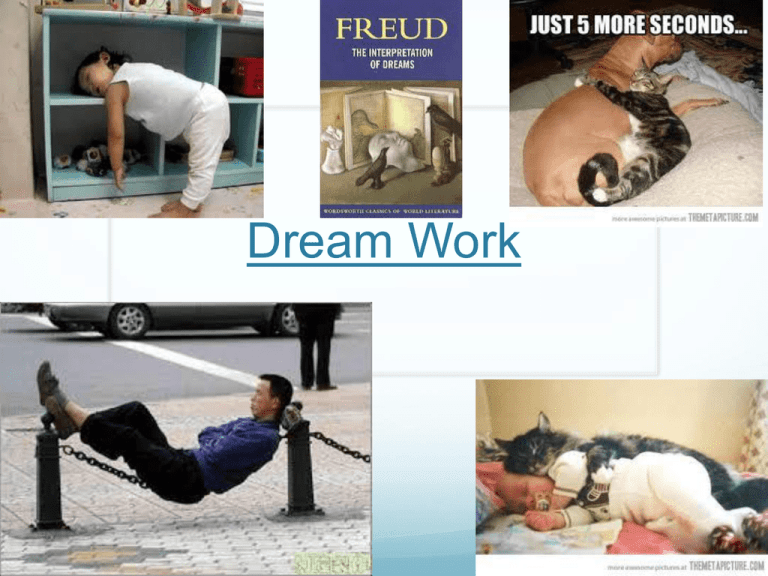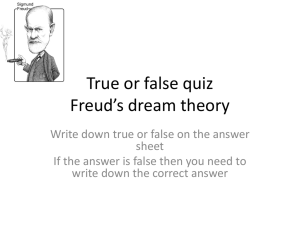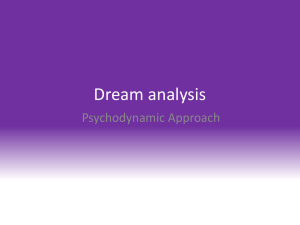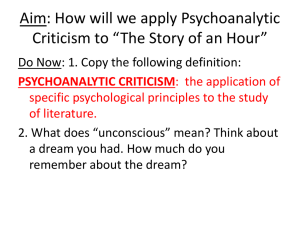
Dream Work
Definition
Dreamwork: the mental activity that translates the
latent wish-seeking unconscious material into the
manifest imagery that disguises it. Dreamwork is NOT
the work one does on a dream. Includes
condensation, displacement of affect, identification,
composition, inversion, and secondary elaboration.
Top 10 dreams are???
With a partner right down the 10 most common dreams
Top 10 dreams are???
http://listverse.com/2008/10/07/top-10-commondreams-and-their-meanings/
Dream Work
The basis of Freud’s theory of dreams is that dreams are a way for anxiety
and other emotions to manifest themselves.
Dreamwork
This is when we turn the Latent Content into the Manifest Content.
FREUD SAW DREAMS AS THE ROYAL ROAD TO THE UNCONSCIOUS…
i.e. the best way to get to the unconscious
Freud thinks the unconscious has ways of hiding the truth even in dreams &
that’s why dreams are mainly symbolic.
And so through analysing persons dreams they can be helped in a
therapeutic way
Thoughts so far?
Dream Work
Latent Content – Underlying wish, desire or emotion, e.g. fear of
being left alone so dream of a boat sailing away from you
Manifest Content – What we actually remember from the dream the story, i.e. remembering that you dreamt of a boat sailing away
Displacement – When we turn the object of anger into something
else. e.g. using a cow as a symbol for your annoying mother
Condensation – When you combine all the things that you’re
angry at into one.
Secondary Elaboration – This is stringing together the symbols
to make a story. This logical version of the symbols may further
confuse analysis.
Doing dream analysis
Only a highly qualified/experienced psychoanalysts are supposed
practice psycho-therapy and therefore use dream interpretation as
part of their diagnostic armour and therapeutic practice.
Everything you know about Freudian theory is relevant in
understanding how dream analysis can be used to help uncover
and solve problems.
Reflect on the following words and think how they might be
relevant to dreams… (the features of analysis)
Unconscious, pre-conscious, conscious, Id, ego, super ego,
repression, transference, displacement, projection, denial,
pleasure principle, reality principle, conscience, ego, anal
personality, Oedipus complex, Electra complex.
Conscious (The actual contents of awareness; i.e., what one is
conscious of at a given moment. Freud's way of talking about "the
conscious" is similar to what a cognitive psychologist means by
attention)
pre-conscious (The entire set of contents of the mind accessible to
consciousness but not in awareness at the moment; i.e., what is
descriptively unconscious but not blocked from access by repression or
other psychological defenses)
Unconscious (Mental processes not accessible to consciousness by
direct means, i.e., by turning attention to them. Their existence must thus
be inferred through examination of gaps in consciousness, symptoms,
dreams, etc)
?
repression (the ego's ridding itself of unacceptable desires
and ideas by dumping them into unconsciousness.)
transference (emotions such as love and hate can be
turned onto the analyst; shows that such emotions are
starting to be released)
displacement (the transfer of high-impact emotionality onto
unimportant material and an emotional cooling to hot
material – dream or in reality)
Projection (is a defense mechanism that involves taking our
own unacceptable qualities or feelings and ascribing them to
other people. For example, if you have a strong dislike for
someone, you might instead believe that he or she does not
like you.)
Denial (one of the best known defense mechanisms, used
often to describe situations in which people seem unable to
face reality or admit an obvious truth (i.e. "He's in denial.").
Denial is an outright refusal to admit or recognize that
something has occurred or is currently occurring. Drug
addicts or alcoholics often deny that they have a problem,
while victims of traumatic events may deny that the event
ever occurred.pleasure principle,
reality principle (the ego operates according to what is
known as the reality principle. The reality principle works to
satisfy the demands of the id in ways that are realistic and
socially acceptable. The opposing process is known as the
pleasure principle, which strives for instant gratification of
the id's urges)
anal personality (a personality characterised by
meticulous neatness and suspicion and reserve; said to
be formed in early childhood by fixation during the anal
stage of development usually as a consequence of
toilet training)
Oedipus complex (the boy wishes to possess his
mother and replace his father, who the child views as a
rival for the mother's affections)
Electra complex (in which girls feel desire for their
fathers and jealousy of their mothers)
How is this done?
The analyst would normally see the client 3 times a
week and a session lasts 50 minutes and would cost at
least £50 making this one of the most expensive
therapies.
It is reasoned that as the analyst knows so much about
the client they will be able to properly interpret the
symbols of the dream in the context of the clients
history and defence strategies.
How it is done? LEARN
THESE STAGES!
The client is asked to recount their dreams in as much detail as
possible.
The therapist listens to this, the manifest content (the dream) in
order to understand the client’s problems.
The therapist is able to uncover the latent content (hidden content
of the dream) of the dream and explain this to the client.
This enables the therapist and client to understand what is
troubling the client and so resolve the issues.
Understanding of symbols is vital to the interpretation of the
dreams especially as one object may represent more than one
concept.
What theories arouse from
Freud's ideas?
Conflict theory
The work of Abend Arlow is associated with conflict
theory.
This is the idea that dreams can be used to uncover
and understands conflict in the unconscious mind the
therapist can then help to resolve the conflict and heal
the person.
What theories arouse from
Freud's ideas?
Object relations theory
The work of Winnicott is associated with object
relations theory.
This is when a negative self has developed early on in
life which holds the person back, guilt may then occur
and other conflicts which may be uncovered through
interpreting the symbols of dreams
What theories arouse from
Freud's ideas?
Interpersonal psycho analysis
Fromme – Reichman is associated with this theory.
This focuses on how a person may hide themselves
when they are interacting with others again the
individuals true feelings about what they do may be
housed in the unconscious mind and only be
accessible through dream analysis.
Evaluation points:
From a psychological point of view what are the
strengths and weakness of this technique?
Evaluation points:
The case study of Y backs up dream analysis theory that anxiety can manifest itself in
dreams, because she was pregnant which is probably an anxious time and she reported
having more vivid dreams.
Freud does back up his theory with a number of case studies such as Dora and little
Hanns. Such case studies are rich in detail and are valid in the sense that they were
collected in real life interactions that would have been taking place whether or not they
were used as research evidence. Also in everyday life many people report having
dreams that are clearly linked to anxieties e.g. missing an exam or having no paper or
pen in an exam the night before. And so it is reasonable to think that dream analysis may
well uncover deep rooted problems.
When it comes to problems of a sexual nature even today sexual issues are often
viewed as embarrassing and so dream analysis may well be a unique opportunity to
unveil something that a person is uncomfortable talking about.
Many people feel that if we do not dream in symbolic forms as suggested by Freud then
it is difficult to explain why dreams should often be so bizarre
Evaluation points:
There are Psychologists that disagree with Freud with regard to the purpose
of dreams e.g. Crick and Mitchison claim that we dream to forget and get rid of
all the unwanted memories that we have collected as the day has gone on. If
this is the case then analyzing the meanings seems a fairly pointless exercise
Other than case studies there is very little evidence that dreams are a way of
getting rid of unwanted desires fears and anxieties, and we can not really
generalize from this type of evidence
According to Freud, dreams can be interpreted by trained Psychoanalysts but
many psychologists feel that even if they are a way of accessing the
unconscious, it is far too subjective for one person to try to interpret another’s
dream; the dream may not be retold exactly as it was experienced at the time
and the analyst may misinterpret the meaning as he /she could never know
everything about a person’s life. Storr 87 says that analysts use their own
subjective personal opinion in analysis. Others may go further and suggest
that a psychoanalytic interpretation is totally contaminated by the analysts
indoctrination with Freudian theory causing a bias towards sexual motivation
at every opportunity
So what about evaluating the usefulness of
dream work?
The client has to remember and report dreams accurately if dream
analysis if to have any value
The client is dependent on the interpretation of the therapist in
understanding what the dreams mean
Symbol interpretation can be very person specific so a different
therapist may interpret dream content differently
The view of dreams as a vital way of accessing unconscious
feelings is not shared by physiological psychologists (1 mark) who
see dreams as a bi-product of the day’s activities, so meaningless
(2nd mark)
Dream analysis can access root causes of a disorder whereas
drug treatments merely mask the problems
Dream analysis is valuable in treating e.g. PTSD whereas drug
treatment damps down the anxiety component
In the exam….










